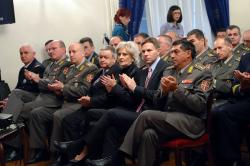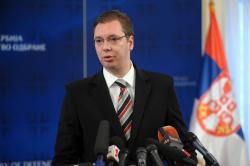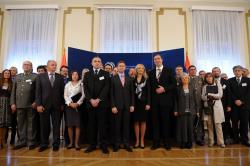- About MoD
Minister and Associates
- Minister
- State Secretary
- Assistant Ministers
- Secretary of the Ministry of Defence
Sectors
- Defence Policy Sector
- Human Resources Sector
- Material Resources Sector
- Budget and Finanance Sector
- Sector for Infrastructure and Hospitality Services
- SAF
- Documents
- Services
- Sport
- Archive
- Contacts
24.10.2012.
International Conference of the Balkan wars Opens
 First Deputy Prime Minister and Defence Minister Aleksandar Vucic opened a two-day international scientific conference "Balkan Wars of 1912/1913: new Perspectives and Interpretations", in the Central Military Club.
First Deputy Prime Minister and Defence Minister Aleksandar Vucic opened a two-day international scientific conference "Balkan Wars of 1912/1913: new Perspectives and Interpretations", in the Central Military Club.On that occasion, the Minister said that he is proud of the fact that the Strategic Research Institute of the Ministry of Defence and the History Institute in Belgrade organized the conference, and that after a hundred years the Balkan wars still attract the attention of the researchers.
- For the peoples of the Balkans these wars meant clear and definite libertarian commitment to the creation of their own states, the states that were created after massive, heavy and difficult battles, which was also confirmed a few years later during the First World War. Such gatherings are an excellent opportunity to present and exchange the research results, views and standpoints of historians of different countries, in order to contribute to a better understanding of war themes and give an overview of the previous research, the Defence Minister said, adding that the stability and peace are the most important things for the South East Europe.
 - Why do we deal with the past? Why is it so important today to study what has happened a hundred years ago? The past is important, but the future is more important. From the past, we need to draw lessons for the future. The future is a chance for Serbia, but the nations who have such a glorious freedom-loving past, such as the Serbian and other Balkan nations, have to build a common future in which peace, stability and development of democracy will be the basic principles, Minister Vucic added expressing his belief that with greater and more significant social and economic development in the future and better cooperation in the security field, Serbia will provide an opportunity for all the lessons to be understood in a better and smarter way, and that the free spirit of the Serbian people never disappears.
- Why do we deal with the past? Why is it so important today to study what has happened a hundred years ago? The past is important, but the future is more important. From the past, we need to draw lessons for the future. The future is a chance for Serbia, but the nations who have such a glorious freedom-loving past, such as the Serbian and other Balkan nations, have to build a common future in which peace, stability and development of democracy will be the basic principles, Minister Vucic added expressing his belief that with greater and more significant social and economic development in the future and better cooperation in the security field, Serbia will provide an opportunity for all the lessons to be understood in a better and smarter way, and that the free spirit of the Serbian people never disappears.Participants in the conference are scientists from Serbia, Russia, Greece, Macedonia, France, Austria, Slovenia, Germany, Turkey, Japan, Montenegro, Italy and Hungary.
 Aspects of the historians related to the preparations for war, military operations, diplomatic and geopolitical causes and consequences, were largely the subject of national historiography, while other parts of the military history of that period were ignored and neglected. This especially applies to the ways in which the war experience of 1912 and 1913 influenced on shaping public perception, social elites and military professionals, the place and the role of personality in these events, as well as their direct connection with the First World War that followed soon.
Aspects of the historians related to the preparations for war, military operations, diplomatic and geopolitical causes and consequences, were largely the subject of national historiography, while other parts of the military history of that period were ignored and neglected. This especially applies to the ways in which the war experience of 1912 and 1913 influenced on shaping public perception, social elites and military professionals, the place and the role of personality in these events, as well as their direct connection with the First World War that followed soon.The topics that scientists will discuss about on the two-day conference on "Military Doctrine of the Serbian Army in the Balkan Wars of 1912-1913", "The British press about the success of the Serbian Army in the First Balkan War", then "The unexpected outcome of the Balkan Wars”. "Carnegie Foundation Report 1912-1913", "Provoking 'Humanitarian intervention' against Serbia in 1913 and others.
- About MoD
- Jurisdiction
- Organisation scheme
- Description of duties
- Minister and Associates
- Minister
- State Secretary
- Assistant Ministers
- Secretary of the Ministry of Defence
- Sectors
- Defence Policy Sector
- Human Resources Sector
- Material Resources Sector
- Budget and Finanance Sector
- Sector for Infrastructure and Hospitality Services
- Special Internal Units
- Office of the Minister of Defence
- Secretariat
- Military Attorney's Office
- Administrative Bodies within MoD
- Defence Inspectorate
- Military Intelligence Agency
- Military Security Agency
- Autonomous Departments
- Public Relations Department
- Military Healthcare Department
- Higher Education Institution
- Defence University
- Specific internal units
- Inspector General of the Services
- Internal Audit Section
- SAF
- Documents
- Services
- Sport
- Archive
- Contacts

